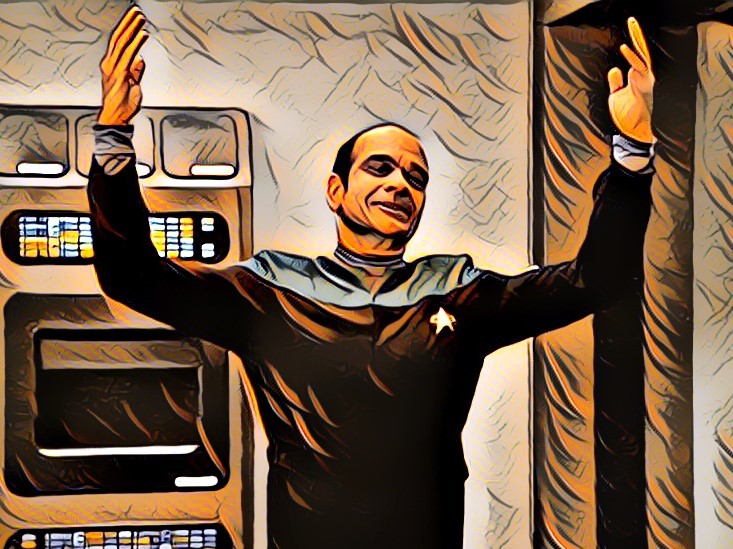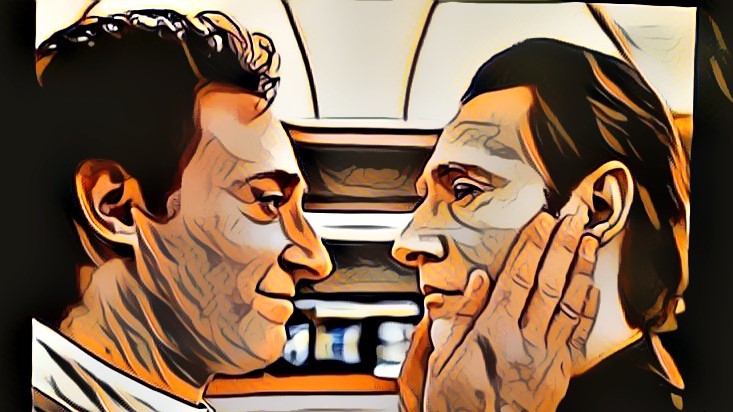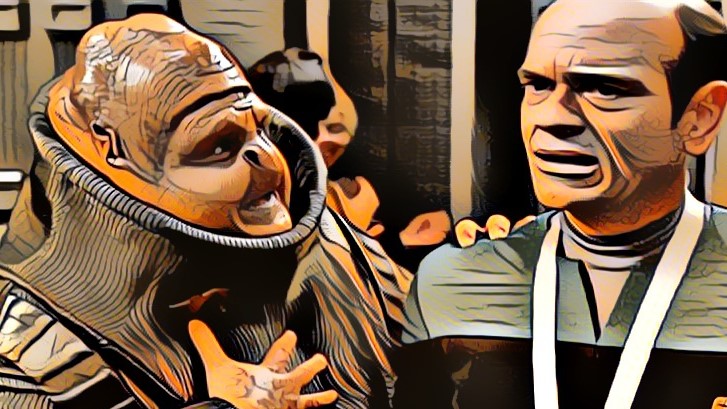Star Trek: The Next Generation – “Birthright, Part 1” (season 6, episode 16)
Written by Brannon Braga; directed by Winrich Kolbe; first aired in 1993
While the Enterprise is docked at Deep Space Nine, Worf learns that his father, long thought dead, might still be alive, and goes in search of a secret Romulan prison camp to learn the truth. Meanwhile, Data meets DS9’s Doctor Bashir, who, unlike most humans, is less impressed by Data’s “extraordinary abilities” than by the details that make him appear ordinary, like his ability to grow hair, or to breathe. While helping Bashir test out a mysterious alien device, an accident knocks Data unconscious, and causes him to experience another ordinary human activity: a dream. Eager to understand the surreal images from his dream – including that of his own “father”, Dr. Soong – Data tries painting them, which raises more questions than it answers when he finds himself painting surreal images he didn’t dream. Data finally recreates the original accident, and dreams once again of Dr. Soong, who provides Data with some cryptic answers … and teaches him to fly.
VS.
Star Trek: Voyager – “Tinker Tenor Doctor Spy” (season 6, episode 4)
Teleplay by Joe Menosky; story by Bill Vallely; directed by John Bruno; first aired in 1999
The Doctor alters his own programming in order to experience daydreams, which are elaborate, often hilarious, and sometimes creepy, and comfort him when his ambitions of becoming an Emergency Command Hologram are quashed by Captain Janeway. His daydreams allow him to command Voyager anyway, and to even defeat the Borg … which impresses the alien who’s been tapping into the Doctor’s daydreams to gather intelligence on Voyager, so his ship can raid Voyager for supplies. His tampering causes the Doctor to lose control of his daydreams and confuse them with reality, at which point the alien starts to realize he’s given his superiors inaccurate information, something his species, the Hierarchy, has little tolerance for. He contacts the Doctor and suggests that they might be able to help each other … if the Doctor can make his daydreams of commanding Voyager as the Emergency Command Hologram into reality.

Voyager has kind of a funny relationship to the rest of Star Trek, doesn’t it? It is, for better and for worse, very much a product of the franchise’s “peak Trek on TV” period: it debuted, in 1995, just months after the final episode of The Next Generation, the series which had made Trek more of a presence in mainstream pop culture than it had ever been; and it ran concurrently, for much of its run, with another Trek TV series, Deep Space Nine. And even though Voyager’s own finale, in 2001, was soon followed by the first episode of Enterprise, it’s worth noting that Enterprise was the first Trek TV series to position itself as a prequel, not a sequel, to the original Star Trek, an approach that Trek would take once again when it returned to TV with Discovery, over a decade after Enterprise ended. This gives Voyager the bittersweet distinction of being the end of the era that TNG started, the end to over a decade of uninterrupted Trek TV taking place in one shared time period, advancing, more or less, in real time. And maybe, some might argue, that ending was for the best; maybe the tendency of episodes like “Coda” to recycle TNG’s ideas, or of episodes like “Deadlock” to tell nondescript sci-fi stories that could just as easily have been told by any Trek series, signaled that this particular era of Trek had gone just about as far as it could.
But one of the things I’ve found most gratifying about writing Trek vs. Trek has been my discovery that I like Voyager quite a bit more, now, than when I first watched it. It has its fair share of bad episodes, of course, but so would any series that produced two dozen episodes a season for seven years; I love TNG and DS9, but those series have some real stinkers, too. What’s always bothered me more about Voyager has been the episodes that were almost really interesting, like the aforementioned “Coda” and “Deadlock” and quite a few others; it’s those episodes, I think, that left me feeling, over the years, like Voyager squandered more of its potential than it ever capitalized on. But as I’ve been rewatching episodes to write about here, I’ve found more episodes than I remembered that really did have something to say, and which made good use of Voyager’s premise and characters in order to say it. I’ve always wished Voyager made better use of the “stranded far from the Federation” conceit, but I’ve been reminded that episodes like “Year of Hell”, “The Void”, and “Before and After” did just that, and did it very well. And as much fun as Robert Picardo is as the Doctor, I’ve often thought of the character concept as little more than Data 2.0, but episodes like “Tinker Tenor Doctor Spy” show that Voyager was actually willing to take the Doctor to some significantly different places than Data ever went on TNG. This becomes all the more obvious when “Tinker”, the daydreaming Doctor episode, is compared with “Birthright, Part 1”, the dreaming Data episode.

“Birthright” is unusual, in a couple of ways. It’s an oddly-structured two-part story; while Worf’s storyline carries on through both parts, Data’s wraps up entirely in Part 1, and we’ll focus on that storyline here, leaving the Worf plotline to discuss another time. “Birthright, Part 1” is also notable for being a rare case of a central character from one series – in this case, DS9’s Dr. Bashir – crossing over to another Trek series while both were still running. But for everything that’s unusual about this episode, it is pretty typical in its treatment of Data. It presents him as a “synthetic life form” who aspires to become more like a human being, and by his story’s end, he has seemingly taken a step closer to that goal: he has gained the ability to dream.
Granted, the episode does approach this familiar story in some interesting ways. As Data himself points out, most characters meeting him for the first time fixate on the ways in which he’s different from the human he might like to be. Right from his first appearance, Data has been largely defined, as a character, by the paradox of being “superior” to humans “in many ways”, but willing to “gladly give it up to be human”, as he says in TNG’s first episode, “Encounter at Farpoint”. Here, though, Bashir is taken aback by how similar Data appears to a human, how “personable” he is. He remarks on how “fascinating” it is that Data’s “creator went to a lot of trouble to make [him] seem human”, which foreshadows Data’s discovery, at the climax of his storyline in this episode, that his dreams are actually part of his programming. Data’s creator, Dr. Soong, tells him outright in one of his dreams that he had hoped Data would grow, over time, to be more like the humans he was modeled after. He had hoped Data would cross “the threshold from being a collection of circuits and subprocessors” to start “a wonderful journey,” and his dreams were meant to be a marker of, or a reward for, that progress. This reframes the paradox of Data’s existence: he’s an android who wants to be more than he was designed to be … which is exactly what he was designed for in the first place.

Which would be kind of depressing, if not for the fact that he’s not actually meant to start dreaming yet. His dreams aren’t the result of a threshold being crossed – they were triggered entirely by accident, “prematurely”, as Bashir says. Why isn’t that depressing? Because it’s the way humans develop. Our personal growth is more accident than design; life happens to us, and we decide what that life means, and what to do with it. Which is precisely what Data does in “Birthright, Part 1”. His dreams were triggered by accident, but he chooses to keep experiencing them. He hasn’t yet reached the “certain level of development” that Dr. Soong had envisioned; Data’s growth isn’t going according to plan. It’s just happening, imperfectly, and he’s making of it what he can … which is the most human thing about him.

Still, all in all, Data’s journey – not just in “Birthright, Part 1”, but throughout TNG in general – is very much presented as the journey he’s supposed to be on, both because it’s what his creator wanted for him, and because … well, because that’s how Star Trek works. Starfleet officers strive to be more than what they are, to be the best possible versions of themselves and of humanity. It’s just what they do. It’s what the Doctor does on Voyager, as well, but Voyager complicates that journey in a way that TNG typically doesn’t … by making it inconvenient. Data progressed through Starfleet Academy, and joined Starfleet by choice, as we’re told, again, in TNG’s very first episode; philosophical questions aside, Data is never really, seriously presented to us, the audience, as anything other than an autonomous being, and characters who question that autonomy never end up looking very good in our eyes (I’ve always thought that the character of Dr. Pulaski was set up for failure by the writers when they repeatedly put her in the position of doing exactly that). The Doctor, on the other hand, came on board the Voyager as a piece of software, not a member of its crew. His catch phrase upon activation, “Please state the nature of the medical emergency,” is a regular reminder that the Doctor, unlike Data, wasn’t designed to be autonomous, only functional, a tool to be used as needed. It’s one thing to accept the autonomy of someone who works beside you as a colleague, but would you be so accepting if Siri wanted to live a life of her own, when you really just want her to send text messages?

In “Tinker Tenor Doctor Spy”, we see the Doctor striving to better himself and expand his horizons in that very Starfleet way, when he pushes to be included on an away mission to a new planet, and when he proposes that his programming be expanded to allow him to become an “Emergency Command Hologram” when needed. We also see those ambitions getting shot down. Which isn’t unfair, exactly; for all its lofty ideals, Starfleet is a strictly hierarchical organization, and Captain Janeway can, and probably should, make staffing decisions based primarily on her own judgement, and not always take the wishes of her crew into account. And the eye-rolling from the bridge crew at the Doctor’s expense is mostly directed at his abrasive, demanding demeanor (all of which fits this episode’s relatively light, comedic tone); Paris isn’t wrong when he points out that the Doctor already holds a position of significant authority aboard Voyager, as its chief medical officer.
But when Paris asks, “Is it our fault that’s not enough for him?” or when Janeway tells the Doctor, “You should know your limits,” and “We all have primary responsibilities,” I can’t help but wonder if these characters would speak in the same way to, or about, any other member of the crew. The idea of an Emergency Command Hologram makes obvious sense, and hangs a lantern on the meta-question of why a starship with the capability wouldn’t have a holographic backup for every critical crew position (considering all the times we’ve seen a ship’s engine room flooded with radiation or deadly gas or what have you, an Emergency Engineering Hologram would seem like a particularly good idea). But beyond that, it’s ironic that Paris, in particular, would be so dismissive of the Doctor’s desire to branch out, considering that we’ve watched Paris himself train as a medic under the Doctor, taking on considerable responsibilities in addition to his own important role at the helm. And while it’s understandable that Janeway wouldn’t make the Doctor’s command reprogramming an immediate priority, her promise to suggest the idea to Starfleet Command at the end of Voyager’s presumably decades-long trip back to Earth – “When we get back to the Alpha Quadrant, I’ll pass it along” – feels more like an insult than an honest answer to his request, and it doesn’t really feel like something she would say to anyone else aboard the ship. Janeway’s position here, like Paris’s, is a bit ironic, considering the way she has, by this point in the series, taken it upon herself to guide Seven of Nine’s individual growth, without waiting to hear Starfleet’s official position on how a Borg drone separated from the Borg collective should be treated (no small question, as TNG showed us in the episode “I, Borg”). Again, where both Seven and Data were discovered by Starfleet, the Doctor was made by Starfleet for a specific purpose; where the crew loses nothing by treating Seven or Data as an autonomous individual (and, in each case, gains a colleague with some “superior” abilities), allowing the Doctor to grow as an individual means he might not always be available on demand in sick bay when he’s needed, as Starfleet made him to be.

And because his attempts at personal growth are met by a very different response, the Doctor’s daydreams play a very different role in “Tinker” than Data’s dreams play in “Birthright”. Dr. Soong tells Data that dreams should be “fun”, and that’s how the Doctor’s daydreams start out: his subduing of a Pon Farr-crazed Tuvok while singing opera might be one of the funniest things Trek has ever done. But immediately after that daydream ends, the Doctor is confronted with unpleasant reality when his request to join an away team is denied, and it soon becomes clear that he’s not daydreaming just because he enjoys it; his daydreams also serve as an escape from the actual Voyager, where he doesn’t always fit into the existing social and command structure the way he would like to. And this is where “Tinker” starts to question some of the more optimistic assumptions about Data’s journey that were apparent in “Birthright”. In a manner that’s typical of TNG’s general optimism (and perhaps of an early 90s sensibility as well), Data’s dreams are presented as a mostly harmless and, again, “fun” way for him to learn more about himself. But in real life, dreams often aren’t fun. They can scare us, or unsettle us, or leave us feeling unrested in the morning. They’re a part of being human, yes. But just like everything else about being human, sometimes they suck, and not in an “at least I learned something from this experience” kind of way – sometimes they just suck. Which is an element of humanity that Data’s Pinocchio-like aspirations rarely touch on: some parts of being human are just bad, and teach us nothing, and we really might be better off without them.

In “Tinker”, The Doctor’s daydreams – which eventually do become as involuntary as actual dreams – certainly are fun at times, and do eventually teach him (and the crew) something about himself: that his desire for personal growth stems from a more selfless desire to be helpful, to contribute to society. But his daydreams are also painful, allowing (or forcing) him to wallow in those desires, instead of dealing honestly with his disappointment. In real life, daydreams can be a harmless, healthy indulgence, but if we’re not careful, they can become toxic, and can make it harder for us to make a decisive choice between working to change things or accepting things as they are. After Janeway denies his request to be made an Emergency Command Hologram, the Doctor’s daydreams of being congratulated by the crew for being promoted to ECH take on a more bittersweet flavor … and, through the further sci-fi conceit of the Hierarchy’s surveillance, his daydreams actually become dangerous, both to himself and to the rest of the crew.

The Hierarchy might be my personal favorite alien species that Voyager ever introduced into Trek, and they’re thematically well-suited to this episode. As their name suggests, they are – somewhat like Starfleet – a highly hierarchical organization. But, unlike Starfleet, the Hierarchy doesn’t temper its adherence to a strict chain of command with a simultaneous expectation that officers will better themselves, that they will embody a spirit of exploration and self-discovery. Members of the Hierarchy are expected to focus entirely on their assigned duties, and to carry out their orders to the letter with no deviation, to the extent that they are even limited to accessing only the exact parts of their ship that correspond to their duty (with the Hierarchy member Phlox being amazed that the Doctor would have seemingly free run of the ship). But while the Hierarchy are much more rigid than Starfleet, they still illustrate the way that social structures, and not just personal growth, can help define what is or isn’t possible for individuals, even in the comparatively enlightened Starfleet.

This is another element of human existence that is rarely dealt with in Data’s journey on TNG. While he does occasionally encounter anti-android prejudice, that prejudice typically comes from individuals, not in the form of systemic discrimination; even in “The Measure of a Man”, where Data’s autonomy is literally put on trial, that trial is to determine whether Data must comply with the orders of one prejudiced superior, not whether he is, say, entitled to the opportunity to advance his rank or expand his responsibilities as a Starfleet officer. The view that Data is a piece of Starfleet equipment, rather than a Starfleet officer, is mostly presented by TNG as an extreme, fringe view, one that doesn’t have a great deal of institutional force behind it. But since the Doctor actually is a piece of Starfleet equipment – or started out that way, at least – Voyager is a little more willing to show him encountering a more systemic type of discrimination, in episodes like “Tinker” and season 7’s “Author, Author”.
In “Birthright, Part 1”, Picard tells Data that he is “a culture of one, which is no less valid than a culture of one billion.” It’s a good line, and a nice sentiment, but … I mean, it’s not actually true, is it? It grossly distorts the meaning of the word “culture”, which is, by definition, something that’s created and sustained by a group of people, something which no one person can control, but which grants more power and influence to some people than others. Data couldn’t really be a culture of one – he exists under, and within, the societal culture of the Federation, and the organizational culture of Starfleet – but it is true that TNG typically presents him to us as if he were. In “Tinker Tenor Doctor Spy”, the Doctor isn’t afforded that luxury. He’s confronted, within Starfleet, with the ugly truth that the Hierarchy represents more overtly: the culture we exist in sets the parameters of what’s possible for us, no matter how much we might grow as individuals. Those parameters can be redefined, of course, as they are for the Doctor, at least somewhat, by the end of this episode, when the Doctor’s resourcefulness and resolve in service of his colleagues has convinced the crew to reconsider what he might be capable of. But, importantly, it’s not the Doctor himself, not his personal growth alone, that redefines what’s possible for him. For that to happen, others’ minds have to change first, particularly the minds of those who have authority over him … in which case, the Doctor is lucky that his commanding officers are more open-minded than those in the Hierarchy.

You mean “little tolerance for” instead of “has literal tolerance for” don’t you?
LikeLike
Yes! Fixed it, thanks.
LikeLike
That’s very interesting take on the two ideas about advanced AI. I sometimes think Star Trek is overly optimistic about our role as humans in the exploration of space, that artificial intelligences will probably do more of it than we will. It’s not hard for me to imagine a future in which artificial intelligences are running the ships and just letting us hitch a ride with them because of the few things we could probably still do better (assuming a Star Trek level of technological advancement).
LikeLiked by 1 person
I definitely think that’s something that sets Star Trek apart from a lot of more recent sci-fi: its assumption that humans would still be steering the ship, figuratively and literally. Even on Discovery, the ubiquitous “computer” is still just a tool for those humans to use in their running of the ship, in contrast to a show like Dark Matter, on which a single AI (embodied in an android) can essentially run the ship by herself; a small group of humans live on the ship and use it for transportation, but aren’t really needed to crew it.
LikeLiked by 1 person
Dark Matter was a cool show. Not one of my favorites, but it certainly had its great moments and share of surprises.
LikeLiked by 1 person